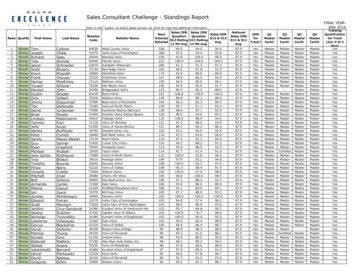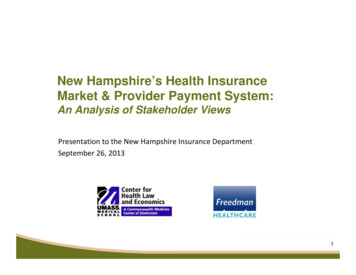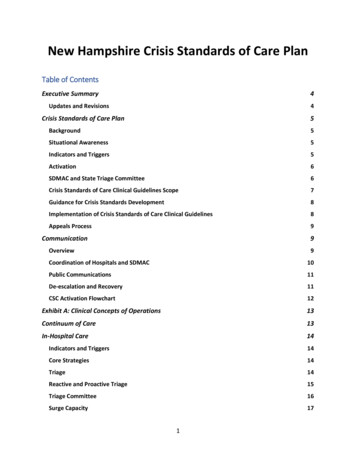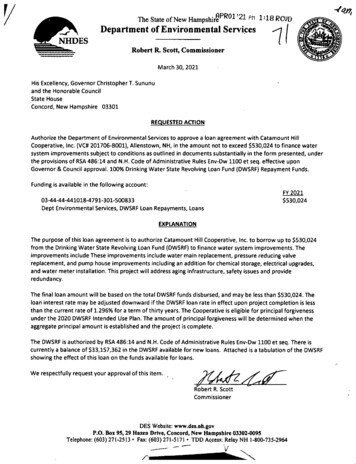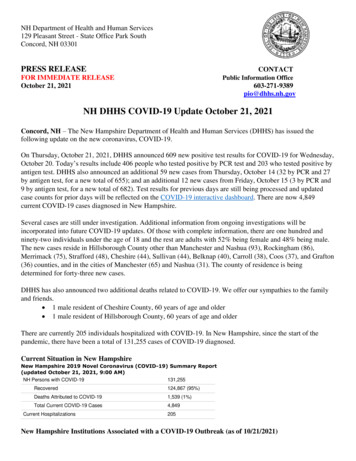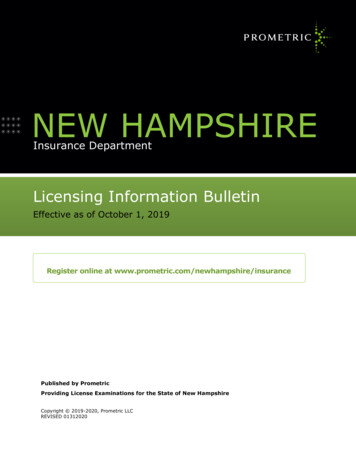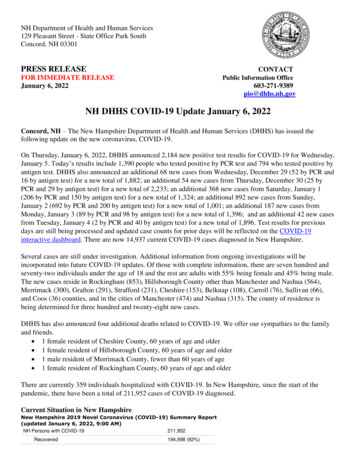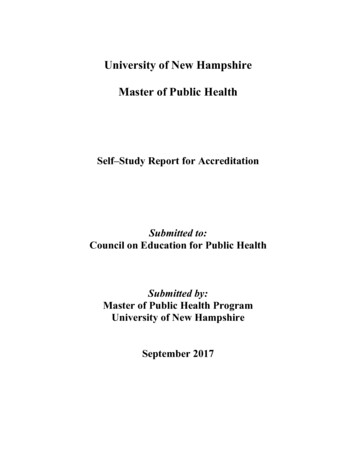
Transcription
University of New HampshireMaster of Public HealthSelf–Study Report for AccreditationSubmitted to:Council on Education for Public HealthSubmitted by:Master of Public Health ProgramUniversity of New HampshireSeptember 2017
Table of ContentsExecutiveSummary 8Criterion 1.0Public Health Program1.11.21.31.41.51.61.71.8Mission .Evaluation .Institutional Environment .Organization and Administration . . .Governance . .Fiscal Resources . .Faculty and Other Resources .Diversity .Criterion 2.0Instructional ter of Public Health Degree .Program Length .Public Health Core Knowledge .Practical Skills Culminating Experience .Required Competencies .Assessment Procedures Bachelor Degrees Graduate Academic Degrees .Doctoral Degrees .Joint Degrees Distance Education or Executive Degree Programs Criterion 3.0Creation, Application and Advancement of Knowledge3.13.23.3Research . 103Service . 110Workforce Development 115Criterion 4.0Faculty, Staff and Students4.14.24.34.4Faculty Qualifications Faculty Policies and Procedures . .Student Recruitment and Admissions . .Advising and Career Counseling . . 1281342
List of TablesCriterion 1.0Public Health ProgramTable 1.2.a:Table 1.2.c:Table 1.5.a:Table 1.5.d:Table 1.6.1:Table 1.7.1:Table 1.7.i:Table 1.7.2:Table 1.7.c:Table 1.8.1Objective, Data System, Responsible Parties . Outcome Measures . . . .A List of Standing and Ad Hoc Committees . . .Faculty Membership on University Committees Sources of Funds and Expenditures by Major Category . Headcount of Primary Faculty for 2014 – 2017 . . .Outcome Measures .Faculty, Students, and Student/Faculty Ratio Non-Faculty and Staff Headcount . . .Diversity Outcomes .Criterion 2.0Instructional ProgramsTable 2.1.1:Table 2.2.b.a:Table 2.2.b.a.i:Table 2.3.1:Table 2.7.2:Instructional Matrix .Matrix of Required Courses Matrix of Elective Courses .Required Courses Addressing Public Health Core Knowledge Areasfor MPH Degree . .Field Experience Projects . .A Matrix of Identifying Learning Experiences Students in MPH Degree, By Cohorts Entering Between 2011-2012 and2016-2017 . .Destination of Graduates by Employment Type in 2017 Criterion 3.0Creation, Application and Advancement of KnowledgeTable 3.1.1:Table 3.1.d:Table 3.2.1:Table 3.2.d:Table 3.3.b.Table 3.3.b.a:Table 3.3.b.b:Research Activity of Tenure-Track and Adjunct Faculty 2014-2017 .Research Activities of Primary and Secondary Faculty . .Faculty Service Activity . . .Identification of Measures .Continuing Education Programs 2014 – 2017 .Required Courses for Public Health Certificate Program . Enrollment of Students in Public Health Certificate Program . .Criterion 4.0Faculty, Staff and StudentsTable 4.1.1Current Primary Faculty Supporting Degree Offerings of Schoolor Program by Department/Specialty Area . 120Outcome Measures . 123Other Faculty Used to Support Teaching Program . 121Quantitative Information on Applicants, Acceptance and Enrollments.130Student Enrollment Data from 2014 -2017 . 131Table 2.4.b:Table 2.6.cTable 2.7.1Table 4.1.dTable 4.1.2:Table 4.3.1:Table 11131161171173
List of FiguresFigure 1University System of New Hampshire 29Figure IIMPH Program Relationships within the College and University30Figure IIILocation of College of Health and Human Services within UNH31Figure IVUniversity of New Hampshire College of Health and HumanServices32Figure VMPH Accreditation Organizational Chart .374
Electronic Resource File1.1 MissionCollege of HHS and UNH Strategic Plans1.3 Institutional EnvironmentAccrediting Bodies1.5 GovernanceBylaws, Committees, HandbooksMembership Lists1.6 Fiscal ResourcesSources for Funds and Major Expenditures1.8 DiversityUNH Hiring Procedures2.1 Degree OfferingsSyllabi – MPH Electives, Schedule of CoursesTable 2.1.12.3 Public Health Core KnowledgeSyllabi – MPH Required CoursesFaculty and Courses 2014 – 2017Table 2.3.12.4 Practical SkillsStudent Evaluations, Student Work SamplesField Study Handbook2.5 Culminating ExperienceIntegrating Seminar 2016 and 20172.6 Required CompetenciesCompetencies Matrix2.7 Assessment ProceduresAlumni and Student Surveys, 2015 Student SurveySemi Structured InterviewsStakeholder/Employer SurveyCourse Evaluations3.1 ResearchPublications3.2 ServiceWorkforces Development/Grand Rounds4.1 Faculty QualificationsPrimary and Secondary Faculty CVs/Resumes4.2 Faculty Policies and Procedures CHHS Promotion and Tenure4.3 Student Recruitment andAdmissionsSample Digital Recruitment, MPH Pamphlet,MPH Information Sheet4.4 Advising and Career ServicesOrientationAdditional DocumentsOpportunity for 3rd Party Comment5
List of AcronymsAAUPAmerican Association of University ProfessorsAPHAAmerican Public Health AssociationAPTRAssociation for Prevention Teaching and ResearchATODAlcohol, Tobacco and Other DrugsBC/BSBlue Cross/Blue ShieldBLCBoston Library ConsortiumBSCBusiness Services CenterCEPHCouncil on Education for Public HealthCHHSCollege of Health and Human ServicesCISComputer Information ServiceCGPSThe University of New Hampshire’s Center for Graduate and ProfessionalStudiesCFOChief Financial OfficerCLAPHPPCouncil on Linkages between Academia and Public Health PracticeECExecutive CommitteeERFElectronic Resource FileFTEFull-time EquivalentGMCGraduate, McNair and CareerHCHealth CareHCFAHealth Care Financing AdministrationHMPDepartment of Health Management and PolicyHRSAHealth Resources and Services AdministrationIHPPInstitute of Health Policy and Practice (Previously NHIHPP)6
List of Acronyms (Cont’d.)IODInstitute on DisabilityMATMaster of Arts in TeachingMBAMaster of Business AdministrationMEdMaster of Education DegreeMSWMaster of Social WorkNASANational Aeronautics and Space AdministrationNCINational Cancer InstituteNEASCNew England Schools and CollegesNH DHHSNew Hampshire Department of Health and Human ServicesNHIHPPNew Hampshire Institute of Health Policy and Practice (Currently IHPP)NHPHANew Hampshire Public Health AssociationPHCPublic Health CertificatePHPPublic Health PracticePIPrincipal InvestigatorRCMResponsibility Centered ManagementUNHThe University of New HampshireUNHDThe University of New Hampshire, Durham CampusUNHMThe University of New Hampshire, Manchester CampusUSNHThe University System of New Hampshire7
Executive SummaryThe Master of Public Health (MPH) Program at the University of New Hampshire(UNH) was approved by the UNH Board of Trustees in 2001 and is designed to provide qualitygraduate education in public health. Given its setting within the state’s flagship university, theProgram is structured to be economically feasible for prospective students residing in NewHampshire, but the Program’s mission and influence extend into Northern New England andbeyond. The Program received its initial accreditation from the Council on Education for PublicHealth (CEPH) in June 2005.The MPH Program is one of 101 master degree programs offered by UNH and isadministratively based within the Department of Health Management and Policy within the UNHCollege of Health and Human Services in Durham, New Hampshire. The Department also offersa baccalaureate degree in Health Management and Policy with two options (Health Managementand Public Health) and two academic minors in the same areas. There are seven full-time facultyand two additional faculty who work primarily outside of the department. These faculty areresponsible for teaching in both the undergraduate and graduate programs.The MPH courses are offered primarily in a face-to-face classroom delivery model,designed to accommodate the schedule of working professionals, who comprise the principalmarket for the curriculum. Courses are taught in the evening on the University of NewHampshire Manchester (UNHM) campus. To provide a greater opportunity for workingprofessionals to have access to the MPH program, courses are taught on Tuesday and Thursdayevenings at the University of New Hampshire campus in Manchester, New Hampshire. Inaddition to the MPH degree, the Program also sponsors a 12-credit Public Health Certificate and8
various elective courses, providing continuing education opportunities for those not wishing topursue a graduate degree.Program faculty are drawn from the full-time UNH faculty, as well as from the field ofpublic health practice. Students can complete the program over two years with continuousenrollment; however, students may take up to six years to complete the MPH degreerequirements per the policies of UNH Graduate School. Graduating classes have ranged in sizefrom 5 – 17 students. We strive to provide an enhanced personal education experience, withsmall class sizes and encouraging access to faculty both in and out of the classroom.The UNH MPH program experienced a fair amount of transition since the lastaccreditation. The program saw a decline in enrollment starting in 2012, with a large drop in2013. To date we continue to see low enrollments each year. At that point, the program had anew Program Director, Barbara Arrington, who enlisted the support of a facilitator to conduct aseries of strategic planning meetings for the program. These meetings were to address thedeclining enrollment, and to better prepare for this reaccreditation period. The College of Healthand Human Services (CHHS) and the Department of Health Management and Policy (HMP)were undertaking a similar process, so support to complete this initiative was found collegewide. The strategic planning group consisted faculty from the MPH and HMP programs, fulltime and adjunct, and a few key stakeholders from within the University. The strategic planninggroup met three times during the 2014 – 2015 academic year. During that time span the groupreevaluated the mission, values and goals of the program, as well as where the future mightevolve to determine where the program should head.Dr. Arrington became suddenly sick during the summer of 2015 and died unexpectedly atthe end of the summer. The 2015 – 2016 school year was used to fill a faculty/Director of the9
MPH position. During this year, the coordinator Ann-Marie Matteucci filled in as much aspossible, given her other tasks. The department also contributed as they could, but the strategicplanning was put on hold.During the 2015-2016 academic year, there were several initiatives taken to moveforward with promoting and supporting the program. Most notably, the hiring of a new Director(start date 8/23/16), the overhaul of the website and changes in marketing which increasedenrollment between spring 2016 – fall 2016, however work on the mission, values and goalswere still hold.Over the course of the 2016-2017 academic year the Dean of CHHS and the Chair ofHMP, in cooperation with the MPH program, enlisted a Work Group charged to study andevaluate the MPH program. This work group ran simultaneously with the self-study period forthe reaccreditation. Given the transition issues with the leadership of the program, theoverlapping of these two initiatives was unfortunate but necessary. The findings of the MPHwork group are shared in this report.Mission of the MPH:“Through instruction, research and service, the mission of the Master of Public Health(MPH) Program at the University of New Hampshire (UNH) provides a pathway to developpublic health officials, establish a collaborative public health workforce, while focusing onsocietal health needs to foster health equity.”10
Criterion 1.0The Public Health Program1.1 Mission. The program shall have a clearly formulated and publicly stated mission withsupporting goals and objectives.1.1a.A clear and concise mission statement for the program as a whole.Mission Statement:Through instruction, research and service, the mission of the Master of Public Health (MPH)Program at the University of New Hampshire (UNH) provides a pathway to develop publichealth officials, establish a collaborative public health workforce, while focusing on societalhealth needs to foster health equity.1.1.b. A statement of values that guides the program.Values Statement:The values of the MPH Program at UNH are guided by the overall values of the College ofHealth and Human Services:Cooperation in the planning, management, and work of the College.Curiosity as a core strategic concept.Excellence both in our individual and collective actions.Integrity to have ethical behavior in our working relationships, practices and decisions.Leadership for improving the health of individuals, families, and communities.Openness in communications and decision-making.Respect for individuals’ roles, diversity, contributions, and viewpoints.Service to UNH, the public, and others to improve health and health care.Sustainability of our College as an educational leader.In addition, the MPH program promotes the development of our students into forward-thinkingpublic health professionals by including curriculum and experience in:Advocacy: Promoting the health of populationsEvidence based practicing: Valuing best practices and maximizing faculty expertisethrough research, shared learning, and practical learning experiencesIntegration: Encouraging collaborative and critical thinking of strategies to betterincorporate Public Health with health and health care systems.Social Justice: Health equity, and integrity11
1.1c. One or more goal statements for each major function by which the program intends toattain its mission, including at minimum, instruction, research, and service.The Program has an overarching goal to address and improve community-based healthdisparities through the1. Instruction: To prepare public health professionals with the knowledge, skills, and valuesto understand of social determinants of health and population health for multiple roles inpublic health organizations and policy development.2. Research: To contribute to the field of public health through the development of newknowledge through applied research to practically address relevant urban and rural healthand health care issues.3. Service: To participate in community partnerships by providing technical assistance andprofessional service to public health settings in both the private and public sectors.4. Organizational: To address the growth and development of the MPH Program.1.1.d. A set of measurable objectives with quantifiable indicators related to each goal statementas provided in Criterion 1.1c. In some cases, qualitative indicators may be used as appropriate.Goal: To prepare public health professionals with the knowledge, skills, and values tounderstand of social determinants of health and population health for multiple roles inpublic health organizations and policy development. Students will benefit from faculty expertise and customized learning through theapplication and completion of research and/or independent learning experience.(Criterion 3.1) Faculty will employ active learning (e.g. student projects, case studies) within thecurriculum. Students will demonstrate the value of public health data by using, manipulating andexplaining data as a core component of their coursework Students will be exposed to career counseling and networking opportunities with keypartnerships to increase students’ post-graduation employment rates. (Criterion 4.4)Goal: To contribute to the field of public health through the development of newknowledge through applied research to practically address relevant urban and rural healthand health care issues. Students will benefit from exposure to current research, including faculty research, in andoutside of the classroom (Criterion 3.1)12
Goal: To participate in community partnerships by providing technical assistance andprofessional service to public health settings in both the private and public sectors. Student field study/integrating seminar (capstone) projects will benefit rural and urbanhealth needs in NH and beyond. (Criterion 3.2) The UNH MPH faculty, students and alumni will assist in the development of the PublicHealth workforce. (Criterion 3.2 and 3.3)Goal: To address the growth and development of the MPH Program The MPH program will be evaluated for both delivery and curriculum to ensure that theprogram continues to meet the workforce needs. A concentrated marketing plan will be developed and implemented. (Criterion 4.3) Assessment of program viability using quarterly budget meetings to assess the Dean’ssupport of the program (Criterion 1.6)1.1.e. A description of the manner in which mission, values, goals, and objectives weredeveloped, including a description of how various specific stakeholder groups wereinvolved in their developmentDuring the 2014-2015 academic year, strategic planning meetings for the MPH were convenedby then Director, Barbara Arrington. Extensive work on the mission, values, goals and objectiveswere developed by the group that included the Program’s Director, Coordinator and HMP Chair.,as well as HMP faculty. Barbara Arrington passed away unexpectedly at the beginning of the fall2015 semester. The strategic planning was not completed as the attention turned to ensuring thecurrent students received what they needed to be successful given the decrease in staff, and tofilling the Director, and then the Coordinator positions.In the fall of 2016 the Department, with the support of the College (CHHS), reinstituted acommittee to review the MPH. The faculty determined that the program needed a full evaluationgiven the continued decline in admissions, and the new leadership. The Dean of CHHS and theChair of HMP charged an “MPH Work Group” to determine the strengths and challenges of theprogram and to determine what changes should be made to the program to ensure its growth andposition in educating the Public Health workforce. Key stakeholders around the state of NewHampshire and University faculty and staff were invited to join the group and they met for four3-hour meetings over the course of the 2017 spring semester. In between the meetings, surveyswere sent to students, alumni and stakeholders (employers). Key informant meetings and focusgroups were also held. Materials from the Work Group can be found in Electronic Resource FileERF, 1.5 Governance. The roster is in the membership list folder and agendas, minutes and thedraft final report are in Committee Membership.13
The members of the work group were selected by the UNH HMP Faculty during departmentalmeetings and other meetings designated to discuss the MPH program. These meetings werefacilitated by John Bunker, Director of External Relations for CHHS, and the Dean of CHHSwas often in attendance. Work group members were selected based on their relationship to theMPH program (instructor, preceptor) and/or by their status in the field in NH (stakeholders,employers, etc.) HMP faculty were invited to participate and three members of the faculty(Caron, Matteucci, and Aytur) were members, as was the new MPH coordinator (Thomas)During the Work Group meetings, members reviewed documentation on the future of publichealth, discussed the strengths and challenges of the program, and reviewed the data collectedsurveys, interviews, and other meetings, as outlined earlier. The labors of the Work Groupconcluded in June 2017 with a written report submitted to the Dean of the College of Health andHuman Services (ERF 1.5 Governance). These findings will be discussed by the HMP faculty inthe fall of 2017 and will assist with the development and growth of the UNH MPH program.Beyond this process, the Program Director/Coordinator makes formal presentations on the MPHprogram to the HMP faculty at the faculty retreat each May and to the HMP Advisory board eachfall. Updates are regularly given to HMP faculty at Departmental meetings, and the Chair ofHMP reports to the Dean and the Executive Council. Copies of the presentations and minutes canbe found in the ERF 1.5 Governance.The HMP faculty revisited and revised the mission, values and goals from the work that hadbeen started in the 2014 academic year. All discussions and materials created by the work groupwere shared with the HMP faculty. The HMP faculty voted to the new mission, goals andobjectives. Some of these were a direct result of the work group (mission, values), and some(goals, objectives) were determined overtime by MPH faculty and the other strategic planningmeetings mentioned. The faculty voted unanimously to adopt the mission, values and goals.1.1.f. Description of how the mission, values, goals and objectives are made available to theprogram’s constituent groups, including the general public, and how they are routinely reviewedand revised to ensure relevance.UNH makes the MPH’s mission, goals, and objectives available to the public through theProgram website and MPH student handbook. The mission, goals and objectives are also madeavailable during open houses, information sessions, and to any interested prospective student.Dissemination also takes place through representation at the New Hampshire Public Health FallForum and at on-site information sessions (e.g., local hospitals, NH Department of Health andHuman Services, etc.)As noted, two advisory boards, the HMP Advisory Committee and the MPH Work Group (whohave been invited to continue as the MPH advisory group), both receive information on themission, values and goals annually at their respective meetings.The URL for the MPH Program is: am14
As described in criterion 1.1.e., the mission, goals, values and measurable outcomes wereaddressed in the Strategic Planning sessions that met in the 2014-2015 academic year, and thenresumed by both an external Work Group in the spring of 2017 and through the work of theMPH Program committee, and the HMP faculty.In May 2017, a vote by the HMP faculty at a special session called by the Chair discussed andapproved the mission, values and goals of the MPH program.During the annual faculty retreat the MPH program is discussed with a review of goals for thenext year. Any modifications in goals are discussed during this meeting and additional meetings,if needed are convened during the summer with key stakeholders. Changes are implemented forthe start of the fall semester.Following the goal review/setting process, over the summer, the goals are translated into rulesand guidelines, as appropriate, by the Program Director. These guidelines are included in theProgram Handbook which is distributed to all students each fall.1.1.g. Assessment of the extent to which this criterion is met and an analysis of theprogram’s strengths, weaknesses and plans relating to this criterion.Strengths: The MPH Program has a clearly articulated mission with values and goals that reflectexcellence in teaching, research that improves the body of knowledge related to publichealth, and service to students, the college community, and the public health communityof New Hampshire. The mission of the Program is publicly stated and noted on the UNH Graduate website,the MPH Program site, the MPH and PHC Student Handbook and other promotionalmaterials. The emphasis of the Program is to train working professionals to become leaders in thepublic health arena. The MPH curriculum reflects thoughtful attention to the core valuesof public health and incorporating the core competencies associated with public healthpractice into the Program by having them serve as the underlying structure of the coursesand expectations of student learning. Since the MPH Program focuses primarily on the development of working professionals,the Program has been located specifically in the most densely populated urban area of thestate, and holds classes during evening hours to reduce any barriers to education that aworking professional might have.Challenges: The program experienced substantial transition in leadership while experiencing a declinein enrollment. There was a delay in first recognizing, and then adjusting to, the changingdemand for the MPH program at UNH. A comprehensive review was delayed due to the unexpected death of the ProgramDirector, Barbara Arrington; the UNH HMP and MPH faculty, along with support fromthe Dean and colleagues from the CHHS has committed many resources to ensuring thatthe program functions with clear direction from a strong mission, values and goals.15
Plans: The program now has the leadership and clarity of mission that lapsed during the periodof transition. Plans moving forward are to strengthen the program with better marketing, a moreflexible learning platform, and a revised curriculum that addresses both the skills neededfor today’s Public Health professional. Future meetings with the Dean of CHHS and the faculty of HMP will determine how therecommendations from the work group are selected and implemented.This criterion is met.16
1.2Evaluation. The program shall have an explicit process for monitoring andevaluating its overall efforts against its mission, goals, and objectives; for assessing theprogram’s effectiveness in serving its various constituencies; and for using evaluationresults in ongoing planning and decision making to achieve its mission. As part of theevaluation process, the program must conduct an analytical self-study that analyzesperformance against the accreditation criteria defined in this document.1.2.a. Description of the evaluation processes used to monitor progress against objectivesdefined in Criterion 1.1.d., including identification of the data systems and responsibleparties associated with each objective and with the evaluation process, as a whole. If theseare common across all objectives, they need to be described only once. If systems andresponsible parties vary by objective or topic area, sufficient information must be providedto identify the systems and responsible party for each.Overall Evaluation of MPH Program (across objectives)The umbrella goals of the MPH program include staying current with the field of Public Healthand providing a high quality educational program that best serves our students, alumni and keystakeholders. To do this the following data are collected and monitored:Student Feedback: Due to the small nature of the student body, and their busy schedules,student input is generally gathered in-person, addressing all students, rather than convening astudent committee. The Program Director visits classes a few times per semester and to makeannouncements and gathers information. Students are also encouraged to schedule meetings withthe Program Director and/or Coordinator to express any concerns or suggestions for the MPHprogram. Further, students were surveyed in the spring of 2015 and the spring of 2017 (ERF, 2.7Assessment Procedures).Alumni Feedback: There is a strong alumni network, resulting from the continualcommunication with MPH alumni throughout the year, both via email and in person at publichealth events. The alumni provide feedback on the Program and their experience with its valueand impact on career their development, and its impact on the public health infrastructure.Alumni were surveyed and were invited to participate in a focus group during the spring of 2017(ERF, 2.7 Assessment Procedures.)Stakeholder Surveys: Stakeholders (and employers) were surveyed in the spring of 2017 toassess their knowledge of the MPH program and how they view the UNH MPH students/alumsare prepared for the workforce (ERF, 2.7 Assessment Procedures.)Objective Specific Evaluation of MPH Program:Goal for Instruction: To prepare public health professionals with the knowledge, skills, andvalues to understand of social determinants of health and population health for multipleroles in public health organizations and policy development.17
ObjectiveStudent Involvement infaculty researchStudent engagement inindependent learningexperiencesActive Learning withincurriculumValue of using andunderstanding Public HealthDataExposure to career counselingData SystemFaculty Activity ReportsResponsible PartiesFacultyStudent Transcripts(independent studies) andfaculty reportsCourse Syllabi, StudentProjects, Case StudiesCourse Work, Transcripts,Field Study Project,Faculty, Students, AdvisorsProgram and College recordsQuality, Effectiveness, Rigorof TeachingSyllabi Review, CourseEvaluation and WrittenFeedback,Director, MPH,Program Coordinator, MPHDirector, Career Services,HMP Department Chair,Director MPH,Faculty/InstructorsFacultyFaculty, AdvisorsGoal: To contribute to the field of public health through the development of newknowledge through applied research to practically address relevant urban and rural healthand health care issues.ObjectiveFaculty will meet researchexpectations (tenure trackonly)Data SystemFaculty Activity ReportsResponsible PartiesChair, HMP DepartmentStudent will be exposed toFaculty ResearchSyllabiDirector, MPH ProgramFacultyGoal: To participate in community partnerships by providing technical assistance andprofessional service to public health settings in both the private and public sectorsObjectiveStudent Projects that benefitrural and urban health needsin NH and beyond.Assist with
MSW Master of Social Work NASA National Aeronautics and Space Administration NCI National Cancer Institute NEASC New England Schools and Colleges NH DHHS New Hampshire Department of Health and Human Services NHIHPP New Hampshire Institute of Health Policy and Practice (Currently IHPP) NHPHA New Hampshire Public Health Association
